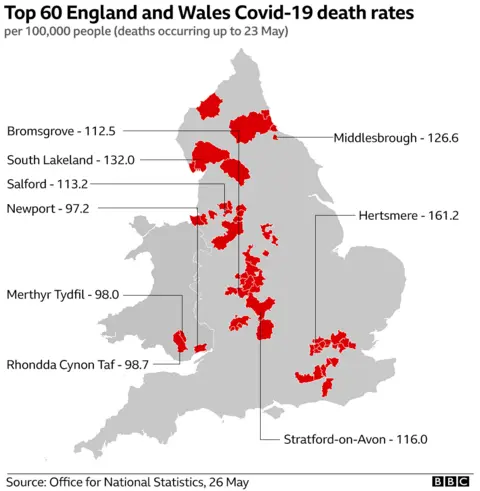Coronavirus: Wales 'may have had more time to prepare'
 Getty Images
Getty ImagesWales may have had more time to prepare for coronavirus - potentially saving lives as the pandemic hit, a report suggests.
Figures show Wales had fewer deaths per person than the rest of the UK in the first three months of the pandemic.
A review, by the Welsh Government's Technical Advisory Group, questions if this was caused by the way the virus spread.
But it warns there is a "small window to learn" ahead of any further wave.
The report says it is "critical" to learn from cases as history shows "further waves could be more severe" and it could be years before the impact on Wales and the UK is known.
"There is a small window for us to learn from the terrible loss of life that the virus has brought," the Examining Deaths in Wales Associated with Covid-19 report warns.
It examines statistics to looks at how the virus has hit different parts of the population in Wales and across the UK.
It states the virus seemed to spread into Wales by travelling along "major routes from England", "along the M4 from Bristol" and from Chester and Liverpool.
The report questions whether this extra time to prepare and lock down could be one reason why there were proportionally fewer deaths in Wales than in England.


The review examines Office of National Statistic figures which, unlike Public Health Wales' daily figures, include all deaths in care homes and people's own homes.
They also include deaths of people suspected by doctors of having coronavirus, not just confirmed cases.
It says that between 1 March and 31 May, 2,257 people in Wales died with coronavirus.
The percentage of excess deaths, which compare all deaths to an average over previous years, was 24% in Wales in the equivalent period.
That compares to 42% in England.
"If Wales had the same percentage of excess deaths as England, there would have been a further 1,628 deaths in those three months," the report states.
"It did not, but we do not yet know why."
"If we can understand what the difference was, and whether we have any control over it, then we could save lives across the UK in future waves of the pandemic."
 Getty Images
Getty ImagesThe review also found:
- Lower numbers of deaths at the start of 2020, potentially due to a mild winter, may have increased the age and vulnerability of the population
- The highest mortality rates were in Cardiff and Vale health board areas, while the lowest rates of infection were in Hywel Dda health board and Powys
- Older people, black, Asian and ethnic minority people, and those from deprived areas had the highest death rates
- Men have consistently higher mortality rates across all ethnic backgrounds
The report warns that, in order to save lives in the event of a future wave, early recognition of resurgence of infection is "critical".
People most vulnerable to the virus must be identified and protected, it says.
But it says more questions must be asked, including how mass gatherings effected the spread of Covid-19, and if other parts of the UK had more time to prepare than England.
Health Minister Vaughan Gething said the report would help "us better understand what factors including ethnicity, age and gender increased peoples risk to this terrible virus".
"This report and future analysis will be vital for future planning and will help us learn more about the coronavirus so we can save lives should there be further waves," he said.
